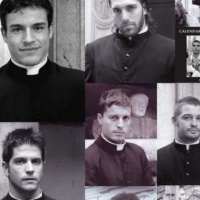(preached on 14 January 1996 at St.Michael’s, Inveresk – edited)
John 1 verses 29-42
Service these days – despite the efforts of Downton Abbey to semi-glamorise it – has certain negative connotations.
It implies subservience, a sense of surrendering personal rights, an abrogation of identity.
If you go to the “People’s Story” museum in the High Street in Edinburgh, you’ll see a display of how it really used to be – a tableau of a young lassie, at the crack of dawn, lighting a fire, working as a very minor servant at Carberry House – in bleak conditions.
Or perhaps some of you had a grandmother or great grandmother who, as a young woman, was in service – and although many were treated well, many others had a miserable existence.
That was the past ….. but……
When I was working in Trinidad, I was distressed by the conditions in which our church “servants” lived – our janitor and his wife. Their home was really just a basic shack with a corrugated iron roof – situated next to the church building.
I brought the situation of the Cordiners (that was their name) before the Kirk Session, only to be told that they were better housed than most in their position.
And I was further surprised when the Cordiners themselves said that they were perfectly happy, indeed “blessed”, to be living in this lean-to shed, and were honoured to be called to serve.
These are the very words that Henry and Cordelia Cordiner said to me, “We are honoured to serve”
I was thinking of these words, when I looked at today’s Gospel Reading –
– here’s John the Baptist, who had already said that, in modern terms – he was only the warm-up man for the Messiah; he said this about Jesus, “He who is coming after me is mightier than I am; whose sandals I am not worthy to carry”
And here he is again today, once more in a secondary role – handing over, as it were, to one who is greater than he is – and feeling honoured to do so.
What is our conception of greatness? Is it someone who is rich and powerful and who can bid others do his will?
H.G. Wells was once asked to select the three greatest men in history. The first thing Wells did was to decide upon a test to determine what makes someone “great”. He came up with this: what did a person do to start people thinking in new directions in a way that eventually changed the course of history? Using this criterion, he narrowed the field to three, Aristotle, The Buddha and (in first place) Jesus of Nazareth.
And should you think that Wells was biased – he was an agnostic
Jesus was the greatest who ever lived. John the Baptizer certainly thought so, and was honoured to bow, as it were, before Christ’s greatness.
Then there was Andrew, one of the first called by Christ – who was honoured to serve and follow.
And look what he does: he doesn’t feel that his place is to feel superior – rather, he fetches his brother, Simon Peter, to meet the Christ.
I have the feeling that Andrew felt that this was an honour – as we find later in the Jesus story – an honour to be working away in the background.
And, if you look at Peter’s story several pages onward, you’ll see that we have a chain reaction of service. And service here is regarded as the highest kind of calling and sacred duty
Christ shows us that service is the new greatness.
Let’s move on now from the very beginning of Christ’s ministry and towards its close.
Here we discover the disciples having an argument about greatness
Their minds were entangled in contemporary ideas of greatness. When Jesus was born, the Caesar at Rome had the title “Augustus” – or “Majestic”. The ruler at Jerusalem was Herod THE GREAT. A common title in Syria and Egypt was “Benefactor”
The Pharisees of Jerusalem and the Galilean towns were clothed in prestige, as were the Temple Saducees
And the disciples, and especially James and John, wanted some of this status. These two wanted to sit on Christ’s right and left side in his glory – that’s the ambition of power!
These men needed a new idea of greatness and Jesus gave it to them.
And he did so by washing the feet of his disciples. A menial task. And Peter quibbled at this; but Christ replied, “If I do not wash you, you have no part of me”
And he says to US – May the leader be the one who serves.
Greatness is to be found in service!
Since he said that, this new concept of greatness has inspired such servants as Peter and Andrew, Francis of Assisi, Florence Nightingale, Albert Schweitzer, Mother Teresa, pope Francis ….and so many unheralded others.
And to us today
A personal remininiscence: in my first charge in 1974, I visited this particular parishioner, an elderly lady who was housebound.
On one particular visit, it was desperately cold and her home-help hadn’t managed to come along that day; as a result, the fire wasn’t lit.
The obvious thing was for me to go to the coal bunker outside, bring in the coal, and light the fire.
She would have none of this! Scandalised: “you CAN’T do that!” Explaining that a “man in your position” should not stoop …. etc
Of course, the word “Minister” comes from the same root as “minor” – lesser, and so one who serves.
In our ministry, as the people of God and as disciples of Christ, let’s never lose track that we have been called to serve – the highest calling, the greatest honour any of us could possibly have.
And that is to bring light to the World and news of salvation to all.
Was there ever a day when such need for such service was so great and pressing?
(a post note: after almost half an hour and virtually a whole box of matches and umpteen firelighters, I still couldn’t get the elderly lady’s fire to light – maybe she was right when she asked me not to bother!)










